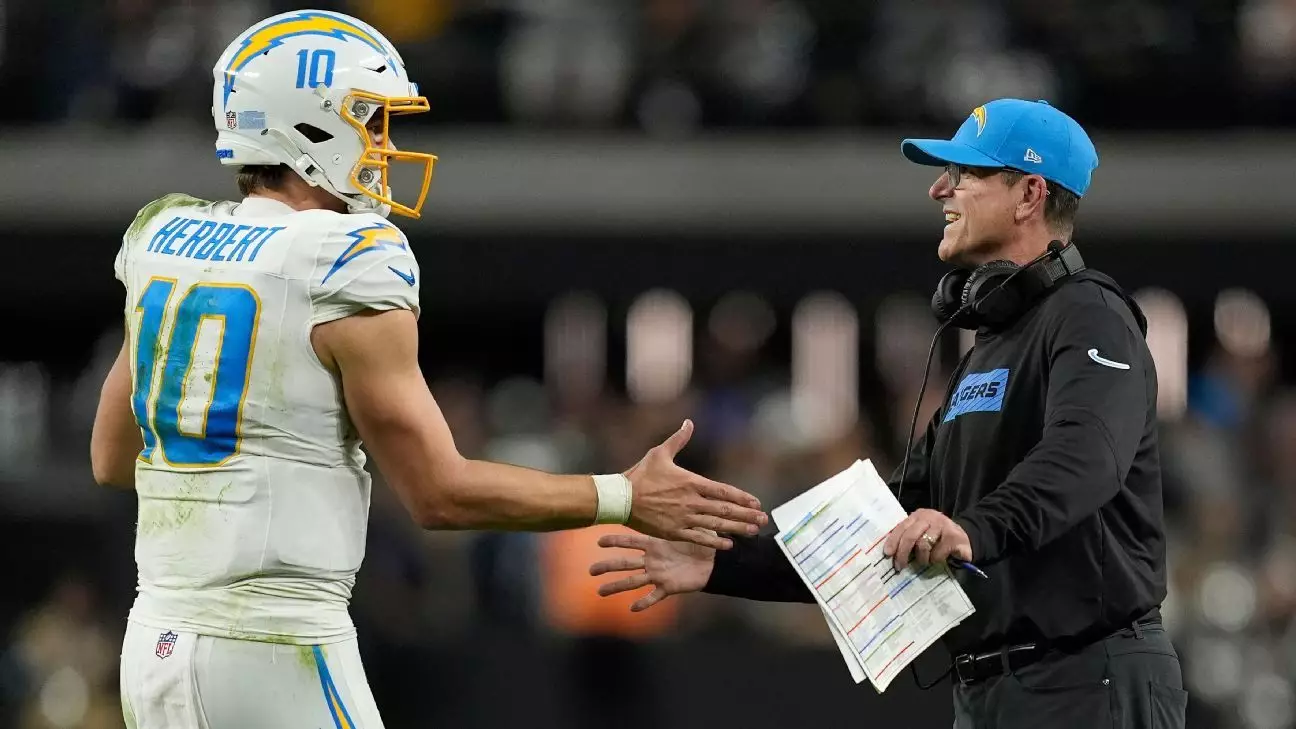The Los Angeles Chargers recently faced one of the most devastating losses in their playoff history, highlighted by the subpar performance of their young quarterback, Justin Herbert. This loss, a 32-12 drubbing at the hands of the Houston Texans, was marked by Herbert’s four interceptions—a striking contrast to his regular-season performance where he posted the fewest interceptions in the NFL. As voices of criticism echoed throughout the sport, it became clear that this defeat was not solely about the player’s execution but also the broader context including coaching decisions, game strategy, and the pressures of playoff football.
Despite being labeled as one of the NFL’s brightest young talents, Herbert has now found himself in a precarious playoff predicament, going 0-2 in his postseason appearances. The most recent defeat further magnified the narrative of underperformance in crucial games, casting a shadow on what has otherwise been an impressive career. Herbert’s struggles culminated in a game characterized by poor decision-making, revealing the volatility that can accompany the playoffs. His inability to maintain composure under pressure was apparent as he threw underthrown passes and overshot targets—a stark departure from the precision he displayed throughout the regular season.
The game started warmly for Herbert, with the Chargers even holding a 6-0 advantage. However, the tides quickly turned when Herbert attempted a risky cross-body throw while under duress, resulting in a critical interception. Such decisions raise questions about his judgment in high-stress moments, a hurdle that he must overcome if he wishes to ascend to the ranks of elite quarterbacks.
Notably, Coach Jim Harbaugh publicly took responsibility for Herbert’s lackluster performance, confessing that the team’s game plan failed to appropriately support their franchise quarterback. This admission raises concerns about the overall preparedness of the Chargers. The coach’s commitment to shielding Herbert from the Texans’ aggressive pass rush proved inadequate, as Herbert faced relentless pressure, resulting in numerous hurried throws.
Analyzing the coaching strategies implemented during the game reveals a critical misalignment. The Chargers’ approach seemed to stress Herbert in ways that undermined his clear strengths. Effective game management involves tailoring tactics that play to the quarterback’s abilities, and in this case, the Chargers seemingly did not provide Herbert with the necessary support. The repercussions were evident; he was pressured on half of his dropbacks, ultimately succumbing to the Texans’ defensive onslaught for four sacks throughout the contest.
The narrative surrounding Herbert post-game has sparked fervent discussions, particularly with many critics and analysts quick to point fingers. General Manager Joe Hortiz notably defended Herbert, likening his situation to that of other legendary quarterbacks who initially struggled in the playoffs. This perspective provides a broader context to Herbert’s career trajectory—a reminder that even the greatest players have had to endure growing pains before maturing into champions.
Yet, there is an undeniable urgency for Herbert to learn from these playoff disappointments. The notion that two playoff games should define his career is indeed contestable, especially given the reality that he has many years ahead of him to refine his craft. Nevertheless, these experiences are integral to his growth as a leader on and off the field, essentially shaping his legacy within a franchise that has long pursued postseason success.
In sum, the Chargers’ disappointing playoff exit is more than just a reflection of one person’s performance; it underscores systemic issues that extend beyond Herbert. As the team navigates this tumultuous landscape, a keen focus on addressing both coaching strategies and player development will be essential. After all, the measure of a quarterback’s greatness often hinges not just on individual performance, but also on the collective readiness of the team in the heat of battle. For Justin Herbert, the road ahead is fraught with challenges, but with perseverance and strategic evolution, there remains a realistic pathway to greatness in the future.

